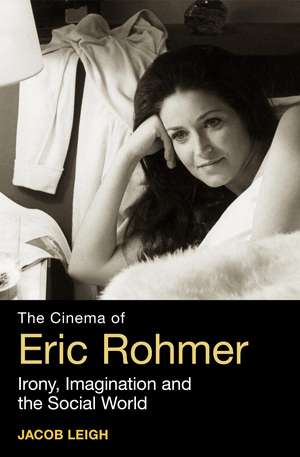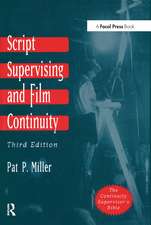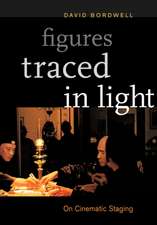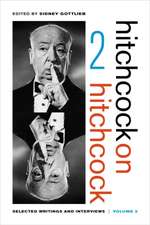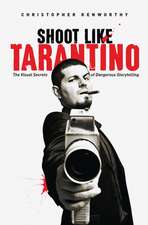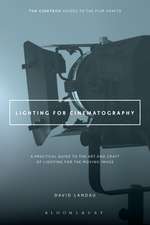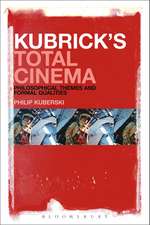The Cinema of Eric Rohmer: Irony, Imagination, and the Social World
Autor Jacob Leighen Limba Engleză Paperback – 4 iul 2012
| Toate formatele și edițiile | Preț | Express |
|---|---|---|
| Paperback (1) | 268.68 lei 6-8 săpt. | |
| Bloomsbury Publishing – 4 iul 2012 | 268.68 lei 6-8 săpt. | |
| Hardback (1) | 952.83 lei 6-8 săpt. | |
| Bloomsbury Publishing – 4 iul 2012 | 952.83 lei 6-8 săpt. |
Preț: 268.68 lei
Nou
Puncte Express: 403
Preț estimativ în valută:
51.42€ • 53.48$ • 42.45£
51.42€ • 53.48$ • 42.45£
Carte tipărită la comandă
Livrare economică 14-28 aprilie
Preluare comenzi: 021 569.72.76
Specificații
ISBN-13: 9781441198310
ISBN-10: 1441198318
Pagini: 392
Ilustrații: 20
Dimensiuni: 152 x 226 x 25 mm
Greutate: 0.59 kg
Ediția:New.
Editura: Bloomsbury Publishing
Colecția Continuum
Locul publicării:New York, United States
ISBN-10: 1441198318
Pagini: 392
Ilustrații: 20
Dimensiuni: 152 x 226 x 25 mm
Greutate: 0.59 kg
Ediția:New.
Editura: Bloomsbury Publishing
Colecția Continuum
Locul publicării:New York, United States
Caracteristici
Very readable overview written by one of the most well-known of Rohmer scholars.
Notă biografică
Dr. Jacob Leigh is Lecturer in the department of Media Arts at Royal Holloway, University of London, UK.
Cuprins
Acknowledgments
Introduction Chapter 1 - 1950s and Early 1960s - Beginnings
The nouvelle vague
Short films
Documentaries
Television work
Le Signe du Lion (1959)
La Carrière de Suzanne (1963) short
La Boulangère de Monceau (1963) short
Chapter 2 - First Successes
La Collectionneuse (1967)
Ma Nuit chez Maud (1969)
Le Genou de Claire (1970)
L'Amour l'après-midi (1972)
Chapter 3 -Two Period Films
La Marquise d'O... (1976)
Perceval le Gallois (1978)
Chapter 4 - Comédies et proverbes - Part One
La Femme de l'aviateur (1980)
Le Beau mariage (1982)
Pauline à la plage (1983)
Les Nuits de la pleine lune (1984)
Chapter 5 - Comédies et proverbes - Part Two
Le Rayon vert (1986)
Quatre aventures de Reinette et Mirabelle (1987)
L'Ami de mon amie (1987)
Chapter 6 - Contes des quatre saisons - Part One
Conte de printemps (1990)
Conte d'hiver (1992)
L'Arbre, le maire et la médiathèque (1993)
Les Rendez-vous de Paris (1995)
Chapter 7 - Contes des quatre saisons - Part Two
Conte d'été (1996)
Conte d'automne (1998)
Chapter 8 - Late Experiments
L'Anglaise et le Duc (2000)
Triple Agent (2004)
Les Amours d'Astrée et Céladon (2007)
Bibliography
Index
Introduction Chapter 1 - 1950s and Early 1960s - Beginnings
The nouvelle vague
Short films
Documentaries
Television work
Le Signe du Lion (1959)
La Carrière de Suzanne (1963) short
La Boulangère de Monceau (1963) short
Chapter 2 - First Successes
La Collectionneuse (1967)
Ma Nuit chez Maud (1969)
Le Genou de Claire (1970)
L'Amour l'après-midi (1972)
Chapter 3 -Two Period Films
La Marquise d'O... (1976)
Perceval le Gallois (1978)
Chapter 4 - Comédies et proverbes - Part One
La Femme de l'aviateur (1980)
Le Beau mariage (1982)
Pauline à la plage (1983)
Les Nuits de la pleine lune (1984)
Chapter 5 - Comédies et proverbes - Part Two
Le Rayon vert (1986)
Quatre aventures de Reinette et Mirabelle (1987)
L'Ami de mon amie (1987)
Chapter 6 - Contes des quatre saisons - Part One
Conte de printemps (1990)
Conte d'hiver (1992)
L'Arbre, le maire et la médiathèque (1993)
Les Rendez-vous de Paris (1995)
Chapter 7 - Contes des quatre saisons - Part Two
Conte d'été (1996)
Conte d'automne (1998)
Chapter 8 - Late Experiments
L'Anglaise et le Duc (2000)
Triple Agent (2004)
Les Amours d'Astrée et Céladon (2007)
Bibliography
Index
Recenzii
Still grieving Eric Rohmer, I applaud this even-handed discussion of his 23 feature films. Jacob Leigh steers clear of cant (whether from theorists or Catholics), sticking close to this consistently intelligent, surprising, and beloved oeuvre. Sensitive to the master's seductive draw and tonic irony, Leigh uncovers a calculated method and discovers the relevance of classic concerns. -- Dudley Andrew, R. Selden Rose Professor of Film and Comparative Literature, Yale University, USA
At a time when the hackneyed phrase 'the magic of the movies' seems to apply only to special effects spectacles, Eric Rohmer's films remind us that cinema's greatest magic is its intimate engagement with reality. In this book, Jacob Leigh effectively articulates the ways that Rohmer's commitment to this truth is developed across dozens of films. A fine and much needed study of a filmmaker whose works appear more impressive and essential with each passing year. --Christian Keathley, Associate Professor of Film & Media Culture, Middlebury College
Jacob Leigh's rich and erudite book is filled with subtle analyses that do justice to the complexity, delicacy, and sensuousness of the work of one of the greatest filmmakers. Both newcomers to Rohmer and those who know his films well will find much that is fresh and stimulating in Leigh's detailed and penetrating close readings. -- Chris Fujiwara, Artistic Director, Edinburgh International Film Festival
A major achievement from one of the leading Rohmer scholars. As the last few paragraphs make clear, cinema has lost a major voice in Rohmer: his "optimism, hope and faith in humanity" are rare commodities these days. Leigh reminds us throughout that the films left behind are full of a delightful tension: there are strong undercurrents of romanticism aching to break through the surface of these elegant, erudite films.
At a time when the hackneyed phrase 'the magic of the movies' seems to apply only to special effects spectacles, Eric Rohmer's films remind us that cinema's greatest magic is its intimate engagement with reality. In this book, Jacob Leigh effectively articulates the ways that Rohmer's commitment to this truth is developed across dozens of films. A fine and much needed study of a filmmaker whose works appear more impressive and essential with each passing year. --Christian Keathley, Associate Professor of Film & Media Culture, Middlebury College
Jacob Leigh's rich and erudite book is filled with subtle analyses that do justice to the complexity, delicacy, and sensuousness of the work of one of the greatest filmmakers. Both newcomers to Rohmer and those who know his films well will find much that is fresh and stimulating in Leigh's detailed and penetrating close readings. -- Chris Fujiwara, Artistic Director, Edinburgh International Film Festival
A major achievement from one of the leading Rohmer scholars. As the last few paragraphs make clear, cinema has lost a major voice in Rohmer: his "optimism, hope and faith in humanity" are rare commodities these days. Leigh reminds us throughout that the films left behind are full of a delightful tension: there are strong undercurrents of romanticism aching to break through the surface of these elegant, erudite films.
